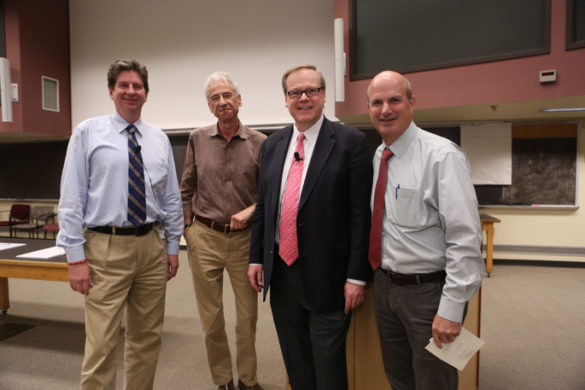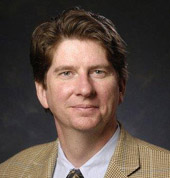
Basic research underway at Vanderbilt University Medical Center is raising hopes that one day it will be possible to reverse memory loss in people with Alzheimer’s disease and stop a major driver of cancer in its tracks.
During a Vanderbilt Cutting-Edge Discovery Lecture last week, David Sweatt, Ph.D., chair of the Department of Pharmacology, and William Tansey, Ph.D., Ingram Professor of Cancer Research, described how their research is being informed by the new science of epigenetics.
Epigenetics refers to factors that can change gene transcription (expression) without altering the underlying DNA sequence.
This is the way new memories are formed and retained in the brain, said Sweatt, the Allan D. Bass Professor of Pharmacology and professor of Molecular Physiology and Biophysics. “By manipulating the ‘epigenome’ with various types of approaches we can enhance memory formation” in animals, he said.
The research has particular relevance for memory disorders such as Alzheimer’s disease and for intellectual disabilities like Pitt-Hopkins syndrome.
Last year Sweatt and his colleagues reported that small molecule drugs which alter the expression of a transcription factor in the brain “normalized” impairments in social interaction, vocalization, learning and memory in a mouse model of Pitt-Hopkins syndrome.
The effects last for months after a single dose. This approach “could potentially be transformative” in the treatment of memory disorders, he said.
Tansey, professor of Cell and Developmental Biology, focuses on MYC, an oncogene that triggers cancerous growth by binding to target genes and regulating their expression.
“If cancer is the emperor of all maladies, then I would argue that MYC is the emperor of all oncogenes,” he said. “It’s estimated that MYC is responsible for about one third of all cancer deaths each year in the United States.”
MYC’s tumorigenic potential depends on its interaction with a chromosome-binding protein called WDR5. Working with Tansey’s group, a team led by Stephen Fesik, Ph.D., solved the crystal structure of the MYC-WDR5 interaction. That has opened the door to developing small molecules that can block the interaction and possibly prevent cancer.
There is a good side to MYC. It plays an important role in embryonic development. “The goal here is to get MYC down below that tumorigenic threshold so that you can preserve some of the normal functions of MYC,” Tansey said.
For a complete schedule of the Flexner Discovery Lecture series and archived video of previous lectures, go to www.mc.vanderbilt.edu/discoveryseries.















